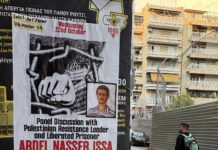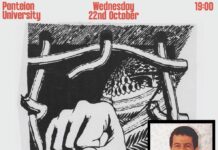Saturday, 23 June
5:00 pm
Friends of the IDF
1430 Broadway at West 40th Street
New York, NY
Facebook: https://www.facebook.com/events/454977998293311

Take action: Sign the petition now – bit.ly/FreeKhalidaJarrar
According to Palestinian news reports, the administrative detention order against Palestinian leader, parliamentarian, feminist and leftist Khalida Jarrar was renewed late on Thursday, June 14, two weeks before she was scheduled to be released after a year of imprisonment without charge or trial. She was seized by Israeli occupation forces who invaded her family’s home in El-Bireh on July 2, 2017, only a year after her release from a prior term of political imprisonment.
Samidoun recently issued a call reiterating our demand for Jarrar’s freedom, joining those from Addameer Prisoner Support and Human Rights Association and others. The extension of Jarrar’s administrative detention does not mean that the campaign is stopping. On the contrary, it illustrates just how critical it is to pressure the Israeli occupation to demand her freedom.
Administrative detention orders, first introduced to Palestine by the British colonial mandate and continued in frequent use by the Israeli occupier, are indefinitely renewable, with no charge or trial, on the basis of secret evidence. The Israeli military courts have not yet confirmed the administrative detention order. While they operate as an essential rubber stamp for such orders, this period is particularly critical to escalate international demands for her freedom.
Another Palestinian prisoner, Hassan Hassanein Shokeh, 29, launched a hunger strike to demand his freedom after he was ordered to administrative detention after completing his six-month prison sentence. Shokeh, who has spent over 13 years in Israeli prisons over multiple arrests, many times in administrative detention, previously conducted a hunger strike in October 2017 to demand his freedom.
Shokeh launched his strike on June 5. He has been imprisoned since September 29, 2017, when he was seized from his home in al-Ram. He was arrested less than one month after he was released, on August 31, 2017, from his previous period of detention without charge or trial. He was initially ordered imprisoned without charge or trial under administrative detention, and he launched a hunger strike in October 2017 to demand his release. After a 35-day strike, he suspended his protest after he was told he would be charged and his case moved to the military courts.
The Ofer military court sentenced him to six months in prison and he was scheduled for release on June 3. However, instead of being released, he was again ordered imprisoned without charge or trial under administrative detention, sparking the renewal of his strike.
Throughout his imprisonment, he has been denied family visits as his family members have been denied permits under “security” pretexts. Only his 10-year-old sister has been allowed to visit him. On 9 June, he was transferred to Hadarim prison from Ofer prison.
The Israeli occupation prison administration frequently uses transfer and isolation against Palestinian prisoners who launch hunger strikes. The transfer process is physically arduous and damaging and often requires the striking prisoners to stand, shackled, for lengthy periods waiting for transportation or to sit in an un-air-conditioned vehicle on metal benches, shackled to the seats. The use of frequent abusive transfers is a mechanism of physical abuse and mistreatment of Palestinian prisoners in retaliation for launching hunger strikes or involvement in the prisoners’ movement.
Shokeh’s strike and the reported renewal of Jarrar’s detention comes as Palestinian administrative detainees have been carrying out a boycott of Israeli military courts for over 100 days. They are refusing to participate in the system that is used to give a faint veneer of a “legal process” to an extralegal process of imprisonment without charge and without trial at the behest of the Israeli occupation military.
Approximately 500 Palestinian prisoners are held without charge or trial under administrative detention, out of nearly 6,500 total Palestinian prisoners. Administrative detention orders are indefinitely renewable, and Palestinian prisoners have spent years at a time jailed through repeatedly renewed detention orders, all on the basis of a so-called “secret file” to which both the detainees and their lawyers are denied access.
Stand with Jarrar and Shokeh to demand that Israel release them, other administrative detainees and all Palestinian political prisoners.
Protest the Friends of the IDF (FIDF)’s support for Israeli war crimes and join the global campaign to demand a comprehensive military embargo on Israel now.
Support the Palestinian national and prisoners’ movements, the Palestinian Resistance, and the liberation of Palestine, from the river to the sea.
Discover more from Samidoun: Palestinian Prisoner Solidarity Network
Subscribe to get the latest posts sent to your email.




